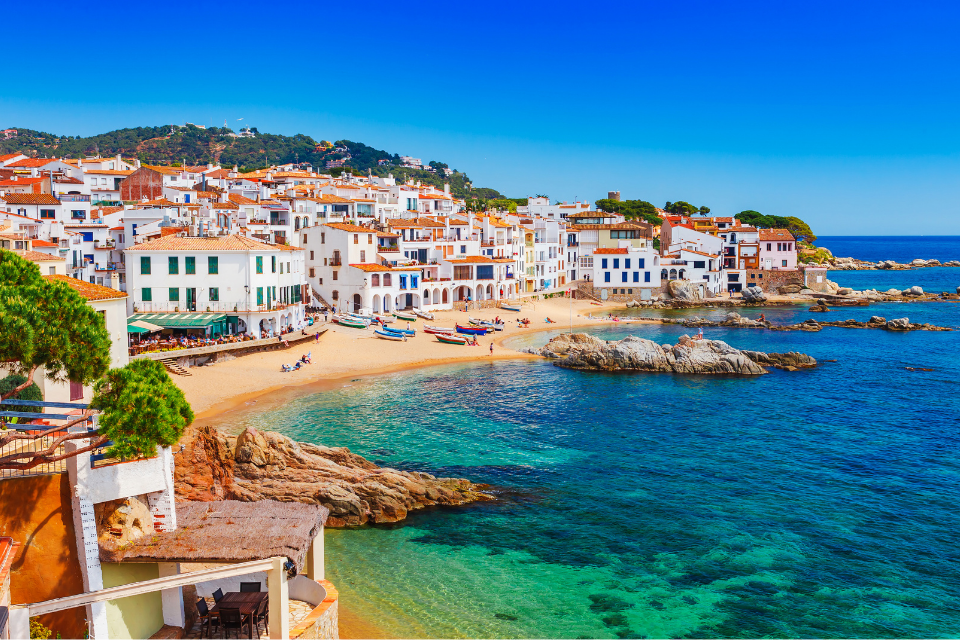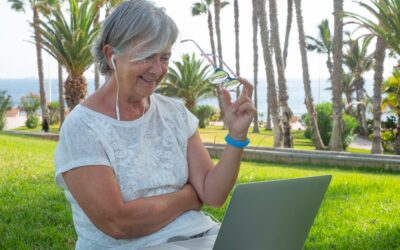Last updated on November 17th, 2023
Featured Image: Carolyn’s dream view on the Costa Brava, Spain (Shutterstock by Oleg_P)
Making my dream of full-time travel real requires planning
By Carolyn Ray, JourneyWoman
Everything starts with a vision for the future. Three years ago, emboldened by a vision of full-time travel, I started downsizing and sold everything I owned. “The Plan” was to travel full-time, learn the local language and connect authentically with people and cultures. Living in Spain was – and still is – at the top of my list. While the pandemic slowed down my plan, I haven’t given up. If anything, I’m more determined than ever to make my dream of full-time travel real. But there is a big barrier: How can I afford to live this dream life? How can travel on a budget?
How to travel on a budget
1. Embrace a slow travel mindset
All indications are that travel is going to be more expensive than it was before. Airlines are cutting capacity which is going to mean higher costs for us. One of the ways we can offset this is to stay in places longer. With a slow travel mindset, we spend more time in one place instead of less time in more places. It also helps us reduce the cost of accommodation, one of the biggest expenses of travel.
“The very act of slow travel is a money-saving initiative, in that the fewer times that you are changing your location, and getting on planes, trains, buses, taxis and whatnot, the less money you’re spending. Also generally speaking, the longer you stay in a place, the more discounted that accommodation will be.”
– Nora Dunn, The Professional Hobo (Nora was a guest on our Travel Lifestyles session on March 11, which also includes tips on protecting your identity and data with VPNs and RFID-enabled accessories. (You can watch the session or read the transcript!)
2. Choose a smaller accommodation
Most women say they prefer smaller accommodations like boutique hotels or homestays, where they feel they have more confidence and control over cleanliness. This also has safety benefits. At a large hotel you may not be remembered, but at a smaller place you can get to know the owner.
Generally speaking, smaller accommodations are more flexible and can offer you incentives to stay longer. Many also offer breakfast, which is a bonus. Look for women-recommended places to stay in our Women’s Travel Directory.
3. Look for an alternative type of accommodation
While women prefer boutique hotels as the ‘safe’ option for travel, there are other alternatives to consider that can help you travel on a budget. Here are nine ways recommended by JourneyWoman readers that can help women reduce their travel costs, including hospitality exchanges, house-sitting or volunteering in trade for free accommodation.
5W: Women Welcoming Women Worldwide (Hospitality Exchange)
Long-time JourneyWomen will know 5W, as it’s called, with fondness. Founded in 1984, 5W is a ‘friendship-based’ model where you can visit or host other women in their homes. There are over 2,000 members in every continent except Antarctica. Recently, I spoke with Caroline Stevens, who has been with 5W for 22 years and is based in London. Caroline says that the community is still mourning the loss of beloved founder Frances Alexander, who passed away in September 2020, but that member-only gatherings are being planned by local chapters in Italy and Seychelles for 2022. An essential condition of membership is to sign the promise of confidentiality, and agree to rules of general courtesy, consideration and common sense. If you can’t host another woman, there is a ‘day host’ option. To join, there is an annual fee of £37 ($51USD/$67CDN) and a renewal fee of £27 a year, with an option for a friendship donation. To learn more: https://www.womenwelcomewomen.uk/article/home.aspx
Servas (Hospitality Exchange)
Servas International is an international, non-profit community of hosts and travellers was founded in 1949 in the aftermath of WWII. Now with 20,000 members, it aims to help build “world peace, goodwill and understanding” by providing opportunities for people to connect with others of different cultures, backgrounds and nationalities. Members can be both hosts and travellers; hosts do not charge for accommodation but there is a maximum of two nights, after which payment can be requested. To join, you must submit a letter of introduction, provide references and participate in an interview and orientation process. Annual fees are based on country, but range from $10 to $85 per year. For example, in Canada, an annual membership is $24 per person plus a $70 Travel Fee. Each traveller must have a Letter of Introduction with an e-stamp, valid for one year, which must be made available to your hosts. Traveller e-stamps are valid for 12 months from the date of receipt of payment. To learn more: https://servas.org/
“Check out Servas Peace School in Turkey. I taught English to the kids in a small village close to the Syrian border 12-13 years ago and have stayed in touch ever since. Currently, they are doing some interesting things online with kids from all over the world.” – Marilyn
Trusted Housesitters (Home and Pet Sitting)
Trusted Housesitters connects home and pet owners with sitters to solve a common problem – how to travel cost-effectively, and have your pets looked after when you do. There are memberships for owners and sitters, and a combined membership. Pricing for owners ranges from C$139- $299 and a sitter membership is from C$139 to $189 a year. A combined membership, which includes both pet and house sitting, is C$189 to $349 a year. This gives you unlimited pet & home care from verified sitters at no extra cost and other benefits. Unlike some other websites, TrustedHousesitters does not require that you have a police background check in order to house sit. To learn more: https://www.trustedhousesitters.com/
World Packers (Volunteer in Trade for Accommodation)
World Packers connects travellers looking to exchange their skills for accommodation by matching volunteers and hostels around the world, and offers placements with internationally recognized NGOs and non-profits in more than 130 countries. The website is free to join/make an account on initially (you can sign in with Facebook) but once you find a host you’re interested in messaging, the fee is $49 for the year.
“This is my go-to now, and provides a wide range of volunteer opportunities where you can volunteer in trade for free accommodation.” — recommended by Nora
To learn more: https://www.worldpackers.com/
WorkAway (Volunteer in trade for accommodation)
WorkAway is a similar site to Worldpackers that lets travellers volunteer on farms, hostels, or social projects around the world in return for free accommodation. It’s the largest work exchange website in the world, with over 1 million hosts available. Most projects listed on WorkAway are in Europe.
“You can go all over the world and for something with a family or school or hostel or farm in exchange for room and usually board. Most are a few weeks or months.” — recommended by Nancy
To learn more: https://www.workaway.info/
Advice from an expert: How to save money for travel
In a recent JourneyWoman pulse survey, 50% of women said finances were a barrier, followed by getting the vaccine (40%) and age – 30% (not enough time to do everything I want).
Libby Wildman, our financial services expert on our JourneyWoman Advisory Council, suggests some ways to start saving now. You can also watch our Travel Essentials webinar on financial planning with Libby from January 2021.
1. When you get your tax return this April/May, set it aside for your next trip.
2. Set up a no-cost bank account ( some banks will even give you $200-$300 to open a new account – worth the research time) that you use only to save for travel, and make a monthly contribution that you can afford every month.
3. Instead of gifts on your birthday, ask family and friends to contribute to your travel fund.
4. Check with your airline – many are now offering refunds, not just vouchers.
5. When renting a homestay, don’t accept the price listed on websites, particularly if it’s low season. Offer half price and see what you can negotiate.
6. Use your credit card points to pay for your credit card-eligible expenses and put that amount of money into your travel fund account.
Do you have more questions for Libby? Email her at [email protected].
Budgeting for Travel
JourneyWoman Webinar: How to Save Money on Travel with Skyscanner
Join us on Tuesday, February 11 for a webinar with Skyscanner to bust open some myths about booking travel and ways to save money.
Holiday Travel Tips to Save Money on Flights
Five expert tips to help you save money on flights and get the most value for your dollar, from travel writer Scott Laird.
Home Exchanges and Housesitting: A Way For Seniors to Travel Responsibly and Save Money
Home exchanges and housesitting are a safe, affordable way for seniors to save money on travel while learning about local culture and traditions.






Fantastic newsletter with so many accommodation suggestions that we wouldn’t likely come across when doing online searches. I’m not so adventurous but have traveled on my own a number of times!
Thank you!
Please add to your home stay travel list Friendship Force International (the friendship force.org). One of the founders of FFI was Jimmy Carter (when he was Governor of Georgia), and its mission is to cross political boundaries through home stays offering cultural exchanges and friendship. FFI is in 60 countries and offers week long home stays with local families.. In addition to getting to know the family you stay with, you also have time to visit local sites and see your destination through their eyes. What better way to learn about a country than to share your experience with someone who lives there? Friendship Force believes a world of friends is a world of peace and that it can change the way you see the world.
A friend forwarded your newsletter to me. Very interesting research and I love your suggestions. I would like to suggest another organization which meets your criteria for homestay, slow travel and wonderful experiences and that is Friendship Force International. It is small group travel, not limited to just women, but because of the safety factor most journeys are majority women. The foundation is clubs visiting other clubs, but if there is not a club near there are individuals who join in the various journeys. The pandemic has limited, or actually eliminated travel for the current time, though the hope is to open to US domestic travel later this year. International travel is dependent on the world opening up, but in the future there will be opportunities to visit and stay with locals on all continents except Antarctica.